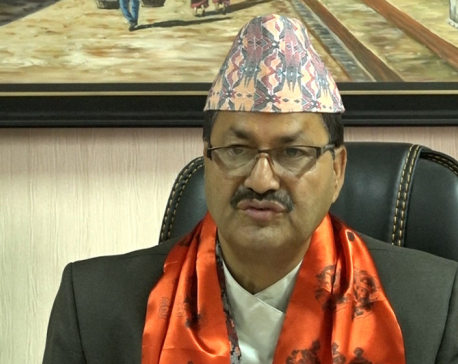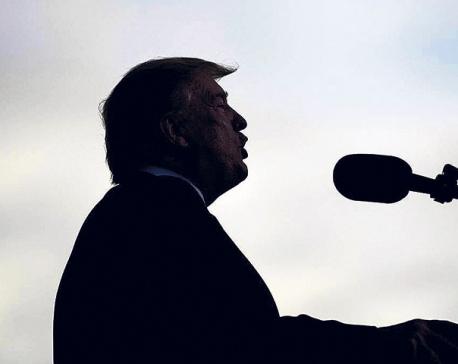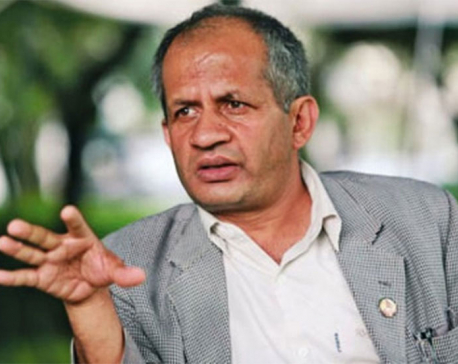
OR


Kamal Dev Bhattarai
The author is editor of www.hakahakionline.com, operated by Nepal Forum of Environmental Journalists (NEFEJ). He writes on foreign policy, media and development issuesnews@myrepublica.com
Our politicians rarely care about diplomatic protocol. They are always ready to meet any foreign guests and speak about foreign policy issues without considering long-term implications
Incident 1: Last year, Nepal conducted three-tier elections. We sought some logistics from India and China. Ministry of Home Affairs and Election Commission wrote separate letters to India requesting to provide vehicles and other materials needed to hold the elections. Indian officials were in dilemma regarding how to deal with multiple letters for the same purpose. So they sought clarification. It clearly shows there was lack of coordination and communication among state institutions. Besides, those communications were not routed through Ministry of Foreign Affairs, the line ministry mandated for external communications.
Incident 2: In 2016, the government suddenly cancelled President Bidya Devi Bhandari’s visit to India. Neither substantial reasons were forwarded nor due process followed before cancelling such an important visit. Political leadership abruptly cancelled the visit without considering diplomatic implications of such a move.
Incident 3: This week, we decided not to participate in the joint military drill of BIMSTEC countries at the eleventh hour. The decision was right but the way it was made was not. Government reached the conclusion to that effect following pressures from various quarters, not out of its own reading and study. It clearly shows that we take decision on any matters without analyzing its implications and studying the nature of the program. Or, we are often guided by the reactions in the media and social media.
When India made such proposal with Nepal Army along with other member states, it was not discussed within the government and line ministries. Clearly no consultations were held with Ministry of Defense and Ministry of Foreign Affairs. Once the proposal was floated, Nepal should have informed a bit earlier that it would not be able to participate because there was no need of such exercise. The last minute-cancellation does not send good message to other member countries.
Incident 4: The 19th SAARC Summit was supposed to take place in November, 2016 in Islamabad. The fate of SAARC summit was uncertain after India announced that it would not participate in the summit. As a SAARC Chairman, it was very difficult for Nepal to deal with new situation. And we lacked prudent decision making ability even then. So we issued two statements with separate content regarding our position on SAARC. At the time, Nepal could not resist the pressure of particular countries, so our position seemed shaky.
This is another example that we take decisions in hurry without proper consultations. There is lack of proper coordination among Ministry of Foreign Affairs, Office of Prime Minister and Council of Ministers.
These incidents clearly show the current functioning of our diplomacy. In other sentence, we can say that we are not serious in our diplomatic dealings at all.
More things change
Even after formation of stable government with two-thirds majority six months ago, there have not been any changes in our working style on foreign relations. We clearly see lack of coordination and communication among state institutions on the issues related to dealing with other countries, and there is lack of transparency as well.
Several meetings of BIMSTEC took place in Kathmandu before the summit but this agenda was not tabled. As an organizer of the Summit, we should have proposed other countries to discuss about it. Currently, Nepal is the chair of SAARC. So BIMSTEC episode should provide a big lesson for us not to repeat similar mistakes on SAARC platforms. Sadly, we rarely draw lessons from such episodes.
In the last one decide, parties blamed each other for the flawed diplomatic dealings. CPN-UML heavily criticized several decisions taken by Pushpa Kamal Dahal and Sher Bahadur Deuba-led government and vice versa. Now, we have a stable government expected to last for the next five years. Thus Foreign Minister Pradeep Gywali must take measures to improve the situation. Basically, he needs to focus on institutional development.
Problem lies in the political level. Our politicians rarely care about diplomatic protocol and they are always ready to meet any foreign guests. They speak about foreign policy issues without gauzing long-term implications. The problem is our politicians speak on foreign policy more than necessary and our bureaucracy speaks less than necessary.
They do not entertain foreign ministry representatives when they meet with foreign guests. Let’s take the example of our former prime ministers. When they visit foreign countries, they act as if they are in an official visit. They raise the national issues and openly solicit their support to resolve them. But none of such meetings are officially recorded.
Not only retired, even the incumbent prime minister and ministers prefer to meet foreign dignitaries without foreign ministry representatives. And any foreign ambassador can easily meet any ministers here. When one ambassador enters Singha Durbar, he or she can meet with half a dozen of ministers.
Ministers and ambassadors reach several understandings on resolving bilateral issues and enhancing bilateral relations. But we do not see the presence of Foreign Ministry representatives in these meetings thought it is mandatory to keep all records of conversation between minister and ambassadors and conduct follow-up. The diplomatic code of conduct that we have remains largely unimplemented. It is gathering dust.
Attention, Foreign Ministry
There are also problems in the functioning of Foreign Ministry. It has not paid sufficient attention to the need of enhancing cooperation with cabinet and ministries. Other ministries complain that functioning of foreign ministry is slow and lethargic, and it is very difficult to get past records and documents. So, Foreign Minister Gywali must think about revamping Ministry of Foreign Affairs and other institutions under him.
Additionally, we have already adopted a federal structure. Seven provincial governments are in place. There is a need of better communication, coordination and coordinated approach between provincial governments and central government on foreign policy issues. Lately, we have seen that some embassies are directly communicating and offering projects to provincial governments. This needs to be checked. Our local and provincial leaders must be trained on how diplomacy functions in federalism and how they should function.
We should not be more reactive in foreign policy issues. There must be better consultations and discussions, and coordination among concerned agencies before we make any move on foreign policy issues.
The author is a Kathmandu based writer, journalist and media educator
devkamal2004@gmail.com
You May Like This

FM Saud pledges to ensure stability of Nepal’s fluid foreign policy
KATHMANDU, July 1: Foreign Minister NP Saud has emphasized the government's efforts to stabilize Nepal's fluid foreign policy and international... Read More...

The Assassin’s False Creed
MOSCOW – For an armchair warrior like US President Donald Trump, who received five deferments from serving in Vietnam, assassinations... Read More...

Foreign Minister to brief international community today
KATHMANDU, Feb 1 : Foreign Minister Pradeep Kumar Gyawali is scheduled to brief the international community today afternoon on various... Read More...







Just In
- NRB to provide collateral-free loans to foreign employment seekers
- NEB to publish Grade 12 results next week
- Body handover begins; Relatives remain dissatisfied with insurance, compensation amount
- NC defers its plan to join Koshi govt
- NRB to review microfinance loan interest rate
- 134 dead in floods and landslides since onset of monsoon this year
- Mahakali Irrigation Project sees only 22 percent physical progress in 18 years
- Singapore now holds world's most powerful passport; Nepal stays at 98th











Leave A Comment